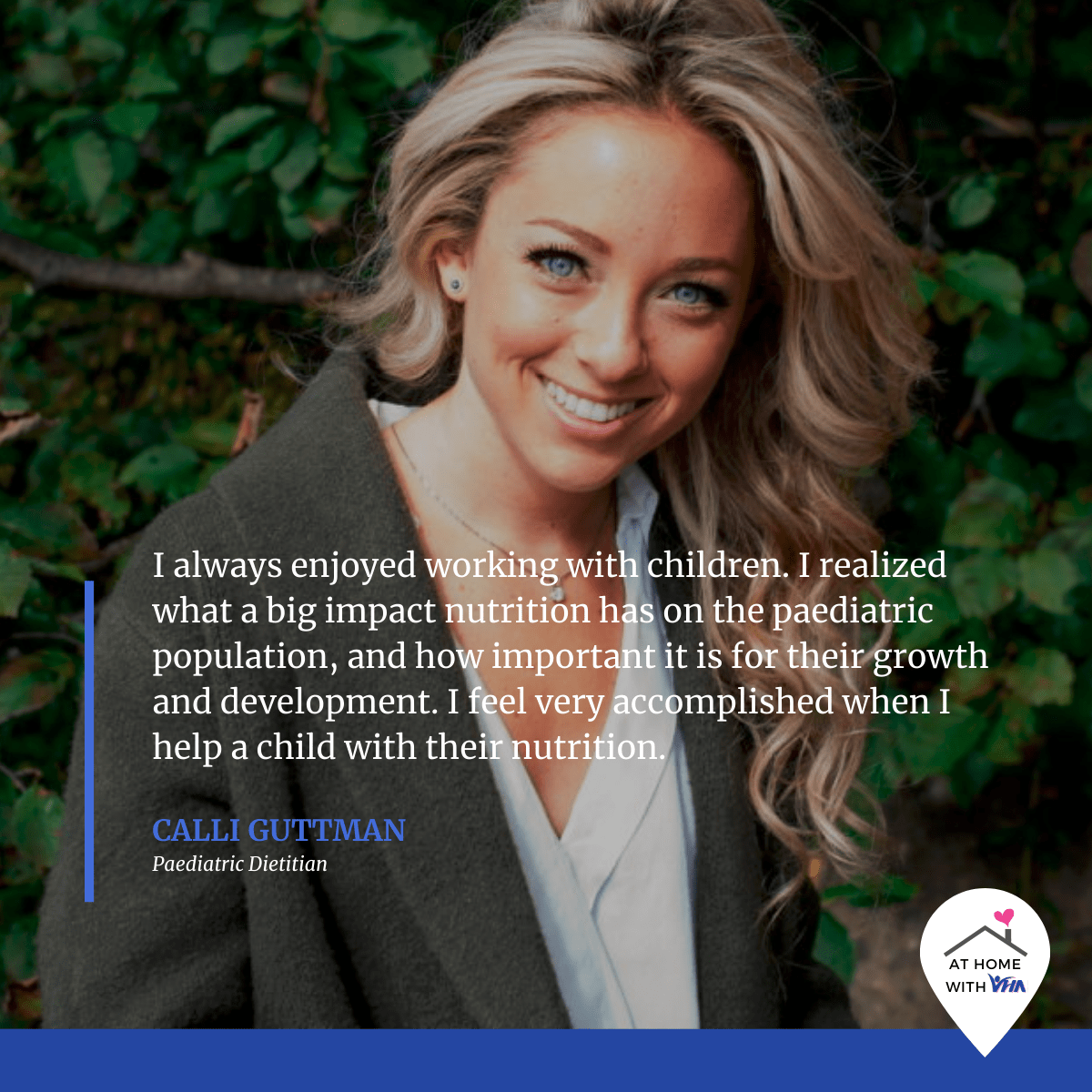At Home with VHA: Cali Guttman, Inspiring Kids to Eat Better

Every role at VHA contributes to something amazing. At Home with VHA tells the stories of those who make up VHA Home HealthCare. This month, to celebrate Nutrition Month and Dietitians Day, we are highlighting our staff. Meeting Cali Guttman, VHA’s first regional Paediatic Dietitian in the GTA.
March 20th, 2019 marks 10 years of celebrating Dietitians Day in Canada. Dietitians play a crucial role in patient recovery, by offering practical solutions to promote health and manage special health conditions. We chatted with Cali Guttman about her inspiration in helping others.
What inspired you to become a dietitian?
When I was 15, I was diagnosed with celiac disease, an immune reaction to gluten. I went to see a dietitian, and I thought to myself, “That’s such an interesting profession, maybe I’ll go into it.” Besides, I really enjoyed my chemistry, science and biology courses. Fast-forward to today, I love working as a Registered Dietitian. When I meet patients with celiac disease, I am excited to help them, because I can relate to what they are struggling with, and it’s fun for me to help them in a more personal way.
So do you specialize in treating celiac patients?
Celiac disease is one of my specialties, given my extensive knowledge about the disorder. However, my true passion is paediatric nutrition. When I graduated from McGill I worked at an adult hospital in Montreal, but I very quickly switched to the Montreal Children’s Hospital. I always enjoyed working with children. I realized what a big impact nutrition has on the paediatric population, and how important it is for their growth and development. I feel very accomplished when I help a child with their nutrition. When you see children after surgery, they’re so happy, they have such a positive mentality; and nutrition plays such an important role in their recovery.
Do you have any recommendations for picky eaters?
Every child is different and recommendations need to be individualized. Some overcome picky eating quicker than others. Overall, it’s important to work with them to expand their diet and to make sure they have some variety to their meals. I also look at the root of why they are not eating – do they have low appetite, are they suffering from an underlying illness or issue? Depending on the level of severity, I can give parents specific recipes that ensure their child eats a balanced diet.
How are you coping with celiac in your adult life?
Celiac disease is an auto-immune disorder, which requires one to follow a gluten-free diet, otherwise there can be serious complications. When I was diagnosed 15 years ago, people were just learning about the condition and what gluten really is, so there were very few good gluten free products on the market. Now gluten has gained such big popularity that there are more tasty products available for those with celiac disease. However, this is not a diet I recommend unless you have celiac disease or a gluten intolerance. Going to restaurants has become tougher because of the big gluten-free trend. Many restaurants don’t take the ‘gluten-free’ concept so seriously because many people claim to eat gluten-free, even though they medically don’t need to. I have to specify that I have celiac disease and that I’m allergic to gluten in order to make sure they serve me 100% gluten-free meals. The good thing is that restaurants now have many more gluten-free products and substitutions.
Do you ever miss gluten?
Obviously there are times when I eat with friends and family, and they are eating the most delicious looking baguette or a slice of cake. I look at it and think, “Oh I wish I could take a bite.” But for the most part there is a gluten-free version of almost everything that tastes good, so I don’t feel that I’m missing out on a lot. I mostly prepare food at home, trying new recipes is fun, so it’s not as difficult as people think it to be.
What advice would you give other Dietitians on spectacular client care?
From my own experience, I recommend staying on top of things. Keep learning, take new courses, read new articles and scientific evidence. Nutrition is evolving so much, that it’s important to keep up with the latest trends and know what’s true and what’s not, so that you can best serve your clients.
